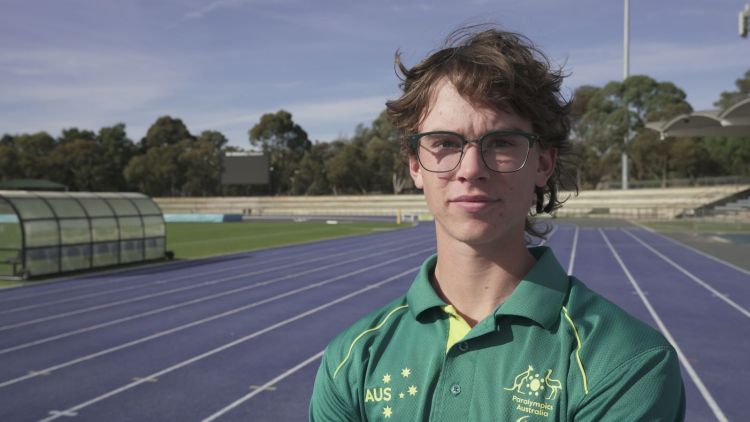His family was told he may never walk, but Angus Hincksman is gearing up to run for gold at the Paris Paralympic Games. The South Australian para-athlete shares his inspirational story of perseverance, passion and the joy of running.
Diagnosed with cerebral palsy after a brain injury at birth, Angus’s early life was marked by uncertainty. “The doctors told my parents that I could be expecting life in a wheelchair, but it ended up turning out a lot better than expected,” he says.
That’s quite the understatement. At just 18 years old, Angus has already won a bronze medal for Australia at the World Para Athletics Championships and counts Nike among his sponsors.
Now, the middle-distance runner is gearing up for the race of his life, the T38 1500m at the 2024 Paris Paralympic Games. He says it’s a chance to show the world that there are no limits for para-athletes.
How it all began
When Angus was growing up in SA, his family refused to let his potential be limited by his cerebral palsy diagnosis. “They were never really willing to just let that slide,” Angus says. His father’s encouragement to stay active fostered a love for sports, ultimately leading him to running.
“I loved all sorts of sports,” Angus says. “I played tons of cricket with my dad, footy in the backyard, all sorts of stuff.” This passion for physical activity eventually led him to a school cross-country event in 2015, where his running journey began.
“Falling in love” with running
Introduced to para-athletics by Novita, an organisation supporting children with cerebral palsy, Angus quickly excelled, winning his first three races. However, it was his first loss that truly fuelled his competitive spirit. “Not winning was like the catalyst for me not stopping,” he admits. “It’s kind of funny because I got hooked on it because of winning, and then I stayed with it because I didn’t [win].”
Angus faced a challenging period where wins were elusive for three years. “I’d spent three years in second place,” he remembers. “It was like something that kept sort of following me around like a bad omen.” However, a victory at the National Athletics Championships in Sydney four years later reignited his passion for the sport. “It was incredible, and that was the moment where I really fell in love with the sport,” he says.
Fancy yourself a gold medal expert on SA’s Olympic and Paralympic stars? Test your knowledge in our QUIZ!
SASI: a crucial support system
Angus’s path to the Paralympics was bolstered by the South Australian Sports Institute (SASI). SASI’s early recognition of Angus’s talent allowed it to provide him with essential support and resources throughout his journey. “They’ve always been really great,” Angus says of SASI. “They go out of their way to reach out to athletes … Being recognised and having people in my corner that actually believe in what I’m doing was something that was really important to me.”
The road to Paris and beyond
Now, with his ticket booked for Paris, Angus acknowledges the magnitude of his achievement. “I’ve been imagining racing in the Paralympics since I was 10 or 11 years old and now to finally be here it’s overwhelming,” he says.
Angus’s journey is about more than personal achievement. He also wants his efforts to give hope to other para-athletes and prove what’s possible. “It’s not just for me running my best,” he says, “but it’s for inspiring people with disabilities and showing them what we’re actually capable of.”

Becoming a role model
Angus takes pride in becoming a role model for young athletes who see themselves in his story. “Now I’m getting reached out to by young athletes who are like me about five years ago,” he shares. “To know that now I’m inspiring kids who were just like me back then feels like all that hard work and going through tough times questioning whether it was worth it is paying off.”
Advice for young athletes
His advice to aspiring athletes? “If you want to do something crazy and put yourself out there, don’t question yourself. Go ahead and do it.” He encourages them to trust their gut, listen to advice, and not be discouraged by naysayers. “The harder you work, the closer everything becomes,” he says. “The other thing I would say is: don’t get your head wrapped around what other people are doing. Focus on the things you can control, and you’ll enjoy everything you’re doing.”
Find out more about Australia’s Paralympic heroes here.
Help us shape The Post by sharing your thoughts in our short survey:


















